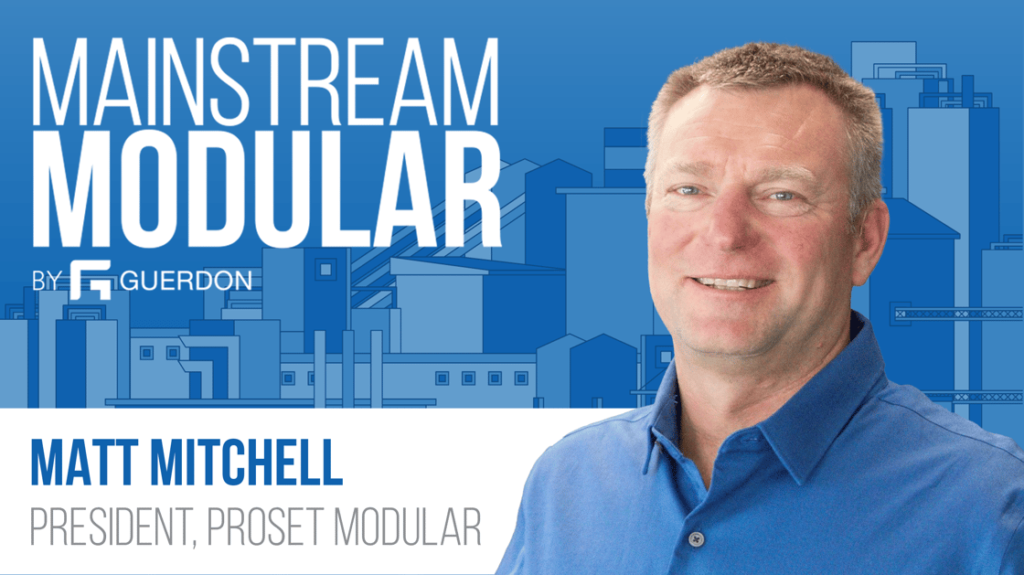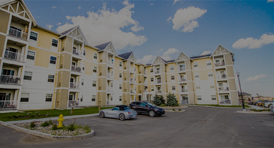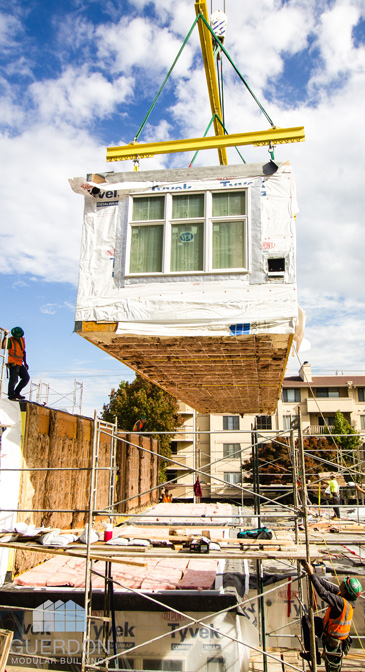
Mainstream Modular: Fastest Growing Markets in Modular
APRIL 16, 2023 – California and New York are key leaders in modular construction in both multi-family modular projects and educational modular products. And five states—California, Georgia, New York, New Jersey, and Pennsylvania—are responsible for almost half of modular construction for educational units.
What is driving the trends for modular construction in these states, and what changes have occurred in the industry over the years?
On today’s episode of Mainstream Modular by Guerdon, host Gabrielle Bejarano speaks with Matt Mitchell, President at ProSet Modular, to discuss his path in the modular construction industry, growth in the industry, and which markets have been experiencing the most growth in modular construction.
Bejarano and Mitchell also discussed…
- Current manufacturing projects and history behind ProSet’s current 20 partnerships
- How Mitchell has discovered the greatest areas of modular construction growth and how ProSet has grown its Colorado presence
- How the modular construction industry is expanding and the influence of price point
Mitchell explained the geographical industry trends: “It seems like the cost of site build in different areas really drives where the modular industry works and where it doesn’t work. And what we’re finding now is it’s working in a much broader area.”
He added, “In the greatest areas of the market growth in the modular, California was a leader in that because it was the most expensive place to build site-built in the country, so we saw lots of modular working in the California area into the states…but what we’re seeing now is it’s expanding into other areas.”
Matt Mitchell is President at ProSet Modular and was previously a partner there. He has been in the construction industry for more than three decades and began his career as owner of High Mark Development.
 Mainstream Modular Spotify Podcast
Mainstream Modular Spotify Podcast  Mainstream Modular Apple Podcast
Mainstream Modular Apple Podcast
Fastest Growing Markets in Modular
Transcript:
Gabrielle: Hello, everyone and welcome to another episode of Mainstream Modular, a podcast brought to you by Guerdon. I’ll be your host for today, Gabrielle, and I’m so thrilled to be joined right now by Matt Mitchell, who’s president at ProSet Modular. And today’s topic is going to be focusing on the fastest growing markets within the modular construction industry. So here to enlighten us on the subject as well as provide any and all actionable industry insights is Matt. So Matt, welcome.
Matt: Thank you. Thanks for having me.
Gabrielle: Absolutely. So Matt, let’s start off by just getting a little brief bio on your background. So let’s start with name, title, what brought you to this industry, and I guess also ultimately what brought you to Guerdon.
Matt: All right. Well, my name is Matt Mitchell. I’m the president and co-founder of ProSet Modular. I’ve been in the industry for over 30 years. I was fortunate enough to meet Guerdon in Williston, North Dakota, back in 2010, 2011 era when construction in the country was at a lull at the time. And everyone that was working in the construction industry was up in the Bakken in Williston, North Dakota. I’d been working in the modular industry, building single family homes in the resort areas of Colorado, such as Telluride, Aspen, and Vail. I owned my own manufacturing facility in 2006, 2007, 2008. After building high-end custom homes, when the recession hit there in 2009, 2010, I found myself going up to Williston, North Dakota to chase the oil boom. Now I was building modular apartment buildings up in Williston, and that’s where I met Lad Dawson, who was a CEO and one of the co-founders of Guerdon. And he came to see what we were doing because he was also in Williston building a hospitality project, and that’s where we met. At the time, Marriott was getting into the modular initiative, and they were pushing their franchisees to use and build modular. And Guerdon had some other projects in Williston. Apartment projects that they hired myself to set. My business partner and I formed a general contracting apartment projects up there to forming a set company called ProSet in 2014 with my business partner, Scott Bridger. We set some apartment buildings for Guerdon in the Williston area that went very well. And then we set the first modular Marriott with Guerdon in Folsom, California in 2015. That kind of really started the modular industry, if you will, commercial modular, really on the Western coast when Marriott was pushing their franchisees to build modular.
Gabrielle: Fantastic. And the rest is history. Well, thank you so much for sharing how you found Guerdon. Well, tell us about – you kind of mentioned manufacturing. Tell us about your current projects and just how you have come to work with over… Isn’t it like 20 different manufacturers? So it’s quite a few. Can you just tell us about that history and how you got into all of the current projects you’re in now?
Matt: Absolutely. So about, I’d say seven, eight years ago, Guerdon was really a pioneer in the industry. They were the only real manufacturer that was solely strictly doing commercial modular, whether it was apartments, assisted living, or hospitality. ProSet was setting 90% of the modulars that we were setting was for Guerdon. This year, we’ll set for 20 different manufacturers. The industry is on a very rapid growth right now, and we’re seeing more and more people get into the industry. It seems to be making more and more sense across the whole country, actually. So it’s on a rapid growth, the whole modular industry, and particularly the commercial modular industry in the hospitality, apartment buildings, and assisted living. So it really started with Guerdon. Many people have jumped on the bandwagon. Like I said, ProSet will set for about 20 different manufacturers this year. We’re aware of another 10 new manufacturers coming online. It’s also gone from wood. Guerdon builds wood modules, and we’re working for about six different steel, all steel modular manufacturers as well. So the industry’s growing in leaps and bounds right now.
Gabrielle: Oh, for sure. I mean, as I said, that’s quite a few manufacturers. Such a variety, and each has a different take to bring to the table. So what have you found that you’ve learned from working with such a variety?
Matt: It’s very interesting, and a lot of it has to do with the engineers that are engineering for the different manufacturers on how these are put together, the different structural connections when you’re going from type 5, 3 buildings to type 3 buildings, and how they’re erected, how they’re structurally connected. So working for different manufacturers is interesting because they’ll build differently, whether they build balloon walls on the exterior of their floor systems or the walls sit on top of their floor systems, how the modulars are structurally connected together. In California, we’re seeing some threaded rod systems that go all the way down through the building, where in less seismic areas, we’re seeing just straps and clips that hold these modular buildings together. So working for different manufacturers is interesting in the fact, and depending on the engineer that they use, the type of structural connections that are used. But it also shows what markets lead the cost of building. For example, we were building an awful lot in California, an awful lot in the Bay Area, which is the most expensive area in the country to build. So when we take a project out of Guerdon and put it in the Bay Area, they felt that it was a bargain, a great deal and a lot less expensive than site-building. Whereas if we were to take that same building and build it in Kansas or Nebraska, they felt it was very expensive. So it seems like the cost of site-built in different areas really drives where the modular industry works and where it doesn’t work. And what we’re finding now is it’s working in a much broader area.
Gabrielle: Oh, well, even just working with so many different manufacturers and seeing that variety that we’re talking about gives you a broader view even of just kind of a visual of the greatest areas that you’re seeing of market growth. So I mean, how have you discovered the greatest areas of market growth when it comes to modular?
Matt: So in the greatest areas in the market growth of the modular, California was a leader of that because it was the most expensive place to build site-built in the country. So we saw lots of modular working in the California area and to this day it still is. But what we’re seeing now is we’re seeing that’s expanding to other areas. We’re a Colorado based company and for the last eight years, we have not been setting any modulars in Colorado due to the fact it was more cost-effective to site-build than it was to build modular. This year we have over a thousand mods under contract to set in Colorado. I think that what that’s showing is the cost of site-built construction is going up to a point where it’s caught up and even surpassed the cost of modular building. So people are taking advantage, even in Colorado now, the efficiencies of modular construction because it’s not just the direct cost. It’s the fact that it can be done in a much shorter timeframe.
Gabrielle: Well, let’s talk a little bit about your company ProSet. How have you seen the company evolve specifically in Colorado where you’re based? Are you working on any important projects there that you can tell us about? Just essentially what was the need to have, I guess, boots on the ground there, so to speak?
Matt: In Colorado, it’s great to get to Colorado. That’s where our company’s based out of and we travel a lot to all these different states and whatnot. So getting to Colorado is a wonderful thing, but we’re currently doing an apartment project actually with Guerdon in Durango, Colorado called the Gauge Apartments. There’s three market rate apartment buildings. We’ve already set two of them, each 39 modular units a piece. The third building will be 48 modular units. It’s going together extremely well and it’s just great for us, great for ProSet to be working in our home state. I know that Guerdon’s got another project in Grand Junction, Colorado. We’ve got the multiple projects on the Eastern slope of Colorado in the Denver area, Colorado Springs. We’re seeing a lot of resort work, workforce housing demand. We have a few hundred months to set a winter park this year. So coming to the resort areas and being able to get the projects done in a timely manner for a good price point is really the driver here for the modular industry.
Gabrielle: Well, Matt, you mentioned the Durango project. I’m interested to learn a little bit more about that, just how it came to be. Were there any challenges that came with its initiation, how the project started?
Matt: Yeah, actually the Durango project was an interesting project due to the fact that we were setting it in the middle of winter in Colorado, well, and through the Rockies had a very strong winter. Lots of snow, lots of delays, lots of mud to deal with. So when we set the Durango project, it was in December, January, when we set those first two phases of the Durango project. The staging yard was very muddy and lots of snow. It was difficult. Mods and the trucks were getting stuck, being taken to the crane, the crane there getting stuck. But we craned this project into place and it was remarkable how little damage there was to these modulars that came out of Guerdon. There were very few cracks. So it was pretty typical to see cracks off a corner of a window or a door when we do the set and structural connections. But in this project, there were very few cracks. It showed how well, even though these mods were being pulled out with loaders and dragged through the mud and very difficult site conditions, these modulars were built extremely well and had very little damage at all, if any at all. There were just a few cracks and it went together very well, even though it was in the middle of the winter in the middle of the Rocky Mountains, it was a good project. And they had to be trucked 800 miles from Boise, Idaho, down to Durango, Colorado. It worked out very well.
Gabrielle: Yes. I mean, it sounds like it did. I mean, that’s impressive for sure. And I mean, working in those conditions is never easy for any project. So you guys did a fantastic job there.
Matt: Thank you.
Gabrielle: Well, as we start closing up the conversation here, how are you seeing the industry expand from your viewpoint and just how does price point factor into this?
Matt: I think the price point’s a very strong driver in this because even though there’s many more benefits to modular building than just the bottom line, a lot of people are going to go to that bottom line. So the fact that you can get a project done faster and make revenue quicker with the modular building practice is a big plus. But also just the bottom line of the whole project needs to be more cost effective for a lot of the developers. The way we’re seeing it expand and grow is just the fact that the building costs and the lack of tradesmen across the country has gotten to the point where site-building is taking so long and costing so much more than it has historically that modular is now a viable option for them. We’re doing a lot of work. We’re starting a project actually tomorrow in Minneapolis. We’ve already set a few hundred modulars in Minneapolis. There’s just some new modular manufacturers out there that have come online. And that’s a market that we didn’t think was going to catch on for a while because of the cost of building. Now that the cost of building has gone up and the time it takes to build a building has gone up, modular is a viable option in those markets. So we’re building or installing market rate apartments in Minneapolis. We’re seeing it in Colorado. We’ve got an awful lot of work in Montana, of course, California, Colorado, and New Mexico, Arizona. So we’re seeing it grow at a rapid rate. We’re kind of a good template to see what’s happening across the country as far as the modular industry is concerned because when developers want to start looking into modular, they’re looking at pricing and we’re getting calls. And since we are able to work, since ProSet’s able to work with all the different manufacturers, people come to us to ask questions about how we should do it, where we should do it, where it makes sense. And we’re getting calls from all over the country right now. Up and down the East Coast is another big thing. I see us expanding to the East Coast very soon. Lots of big developers starting their own modular manufacturing facilities. So I see that number going from 20 different manufacturers that we’re working with now to over 30 in 2024 and above in 2025 and across the whole country. I think modular has been accepted now in the United States as a viable, cost-effective, good building method.
Gabrielle: Oh, for sure. And I mean, you read my mind there because I was going to ask you, what’s in the future for ProSet as well as the modular industry in general that you were thinking?
Matt: And I think it is expanding. I think there’s great expansion in both wood and steel. I haven’t touched on that too much in this conversation, but we’re seeing more and more steel manufacturers getting involved, which allows the modular industry to go higher. With wood construction, we can go to five stories of wood construction. So we could build five modular stories over top of two concrete podiums or something like that to getting seven stories or something like that. But that’s about as high as you could go in the wood world. So I think we’re seeing more and more steel modulars manufacturers coming into play here. And we’re seeing plans right now. We have a 15-story building in California that we’re going to be building out of steel mods, talking to numerous other steel manufacturers to take it, hit that mid-rise sector, anywhere from six, seven stories up to 25 stories. And we’re talking to probably six or eight different manufacturers right now that are looking to go steel. And then, like I said, another dozen manufacturers that are looking to build wood that would be in that three-story walk-up market. Whether it’s market rate housing or workforce housing, hospitality, there’s just such a high demand for that. I think that the wood modular industry will be around forever. But what’s new to the industry is the steel mods and being able to hit that mid-rise market.
Gabrielle: Well, so very cool. Thank you for sharing with that, Matt. And that wraps up the conversation for today. So thank you for joining us on today’s discussion to talk about the fastest growing markets within the modular construction industry. We learned a lot as always, so thank you.
Matt: Thank you very much.
Gabrielle: Of course. And as always, if you’d like to learn more, please visit guerdonmodularbuildings.com and look for this podcast wherever it is you get your podcasts at. I’ve been your host, Gabrielle. Thanks for tuning in.
About Guerdon
Guerdon is the leading manufacturer of large-scale, commercial modular construction projects in the Western US and Canada. Guerdon’s modern, innovative modular technology combines on-site construction with precise off-site factory assembly line production. Traditional schedules are shortened substantially because modular units are constructed in our factory-controlled environment while site work and foundation construction are completed concurrently. Guerdon helps developers, architects and general contractors gain greater control over project quality, schedule, and the bottom line. Guerdon’s factory and corporate office are in Boise, Idaho serving 12 western states including California, Colorado, Idaho, Montana, Nevada, North Dakota, South Dakota, Oregon, Utah, Washington, Arizona and Wyoming as well as Canada.








